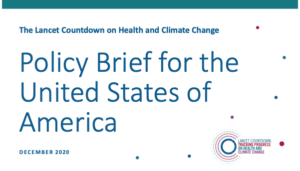New Lancet Countdown Report Recommends Swift Action to Achieve Health Equity through Climate Action
On December 2, the 2020 global report of the Lancet Countdown on Health & Climate Change was released, along with the Policy Brief for the U.S. Each year, the Lancet Countdown tracks more than 43 indicators on links between health and climate change and this year presents the most worrying outlook to date as key trends worsen. However, the latest report finds that with climate action, the lives of millions can be improved and saved. Importantly, the report notes progress in the health sector. The health care sector, individual health professionals, and their associations are taking action and those actions are being translated into the broader public discourse.
Renee Salas, lead author of the U.S. Lancet Countdown Policy Brief and practicing emergency medicine doctor said, “This past year, we have seen the harms of our converging crises – COVID-19, climate disasters, and systemic racism; it’s been a preview of what lies ahead if we fail to urgently make the necessary investments to protect health. Just like in my emergency department, I can’t take one health problem and place it in isolation because one insult on the body creates new problems and worsens old ones. We must take an integrated approach when tackling these challenges. Climate action is the prescription we need for better health and equity as we emerge from this pandemic.“
The global report has three key messages:
- No country – whether rich or poor – is immune from the health impacts of climate change. Right now, people around the world face increasing extremes of heat, food and water insecurity, and changing patterns of infectious diseases. Unless urgent action is taken, the health impacts of climate change will bring further disruption, threaten lives and livelihoods and compromise the hospitals and clinics we depend on.
- The COVID-19 pandemic and climate change represent converging crises. Wildfires and tropical storms in 2020 have tragically shown us that we don’t have the luxury of tackling one crisis alone. At the same time, climate change and infectious disease share common drivers. Responding to climate change today will bring about cleaner skies, healthier diets, and safer places to live–as well as reduce the risk factors of future infectious diseases.
- Aligning the global recovery from COVID-19 with our response to climate change offers a triple win: improve public health, create a sustainable economy, and protect the environment. But time is short. Failure to tackle these converging crises in tandem would move the world’s 1.5C target out of reach, damaging the health of the world’s 7.8 billion citizens in the short and long-term.


And top findings on the converging crises from this year’s U.S. Policy Brief include:
- Air pollution is killing Americans. More than 68,000 people died prematurely in the U.S. from air pollution in 2018. Nearly 25,000 of those deaths are from particulate (PM 2.5) pollution generated by agriculture and transportation.
- Your zip code determines your health. The Brief examines how climate change further exacerbates existing racial health inequalities that exist because of ongoing discriminatory practices. Early research suggests that exposure to air pollution may make people more susceptible to severe cases of COVID-19, and thus could be part of the reason more BIPOC people are dying from the virus than white people.
- In addition to air pollution, heat also creates deadly conditions: In 2019, the U.S. experienced over 102 million more days of heatwave exposure (compared with a 1986-2005 baseline) affecting older persons (adults over 65). In the past two decades, heat has killed twice as many older people, reaching a record high 19,000 deaths in 2018. The U.S. saw 2 billion potential hours of labor lost due to extreme heat across the service, manufacturing, agricultural, and construction sectors in 2019.
- Wildfire risk is increasing. Individuals in the U.S. experienced 1.85 billion more person-days (one person experiencing one day) of exposure to high wildfire risk in 2016-2019 compared to 2001-2004.
- Life-threatening bacteria is increasing in coastal waters. The suitability of coastal waters for growth of Vibrio bacteria has increased by as much as 99% in the Northeast over the past five years.
“This year’s Lancet Countdown is the latest warning that the U.S. is going in the wrong direction on climate change and health. But it’s not too late to change course. … Together, we can build back a healthier, more equitable, and climate-resilient nation.” Dr. Kim Knowlton, Senior Scientist, Natural Resources Defense Council

